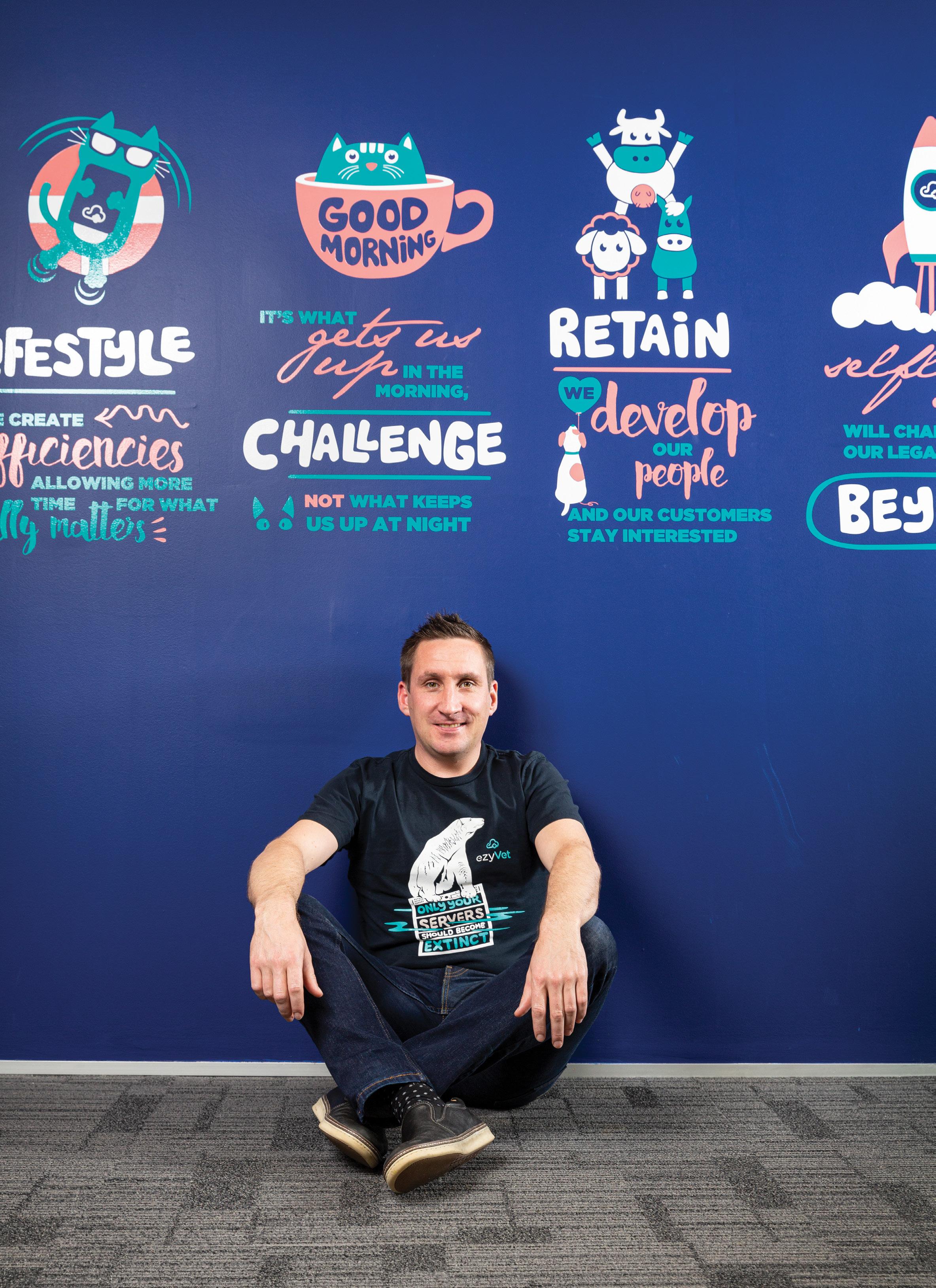
15 minute read
Strength in numbers
by VetScript
Caitlin Sykes showcases a Kiwi-made veterinary service that’s also an international success story.
GOOGLE, APPLE, FACEBOOK,
Advertisement
Amazon – when we think of tech company success stories, it’s common to think of firms that have trod paths from the US. However, veterinary software firm ezyVet has flipped that notion on its head.
From its Auckland headquarters, ezyVet has been steadily carving out a niche as a world-leading provider of cloud-based veterinary practice management software. Since its product first launched around seven years ago its team has grown to 130 in three offices (including Dallas and London), and customers in 15 countries are now using the software in a wide range of clinical environments and situations.
“Just like Xero took small business accounting from shoe boxes filled with receipts into a digital environment and created an ecosystem around that,” explains Rafael Lee, ezyVet’s Customer Manager at innovation agency Callaghan Innovation, “ezyVet is digitising what has traditionally been an environment of clipboards and paper-based records in their own niche, of veterinarians.”
It’s an approach that has particularly resonated in the US market, which now accounts for 79% of ezyVet’s business.
“It’s funny – when we talk to veterinarians in New Zealand, a lot of them don’t realise we’re a Kiwi company,” says ezyVet founder and CEO Hadleigh Bognuda. “They think we’re from America because we’re so big there.” ezyVet has experienced average tripledigit annual revenue growth in the past half-dozen years, but, says Hadleigh, there’s still much ground to be gained. The company’s goals include having 50% of all veterinary professionals trained to use its system, and to become the number one practice management software of choice among veterinarians globally.
A serial entrepreneur, Hadleigh ran a technology business before founding ezyVet that supplied pharmacists with tech hardware and other IT support.
“We had our points of difference, but a laptop is a laptop and the market was quite cut-throat,” he explains.
“I saw an opportunity with our software to make something unique, where you’re not necessarily competing on price, but more on your ability to solve someone’s problems.”
The company had already partnered with software providers in the pharmacy space, so looked for opportunities among others with similar needs, such as lawyers, accountants and veterinarians. One customer in particular – a large veterinary referral practice in Auckland
– was looking for a software solution to capture medical record data that could be turned into letters to referring veterinarians. Unable to find a suitable existing product for the customer, Hadleigh saw an opportunity to develop a software solution.
“That was back in 2007. We employed a fairly small team of talented people and set about building this software product.
ezyVet CEO Hadleigh Bognuda says the team spends a lot of time showing customers how to optimise the software to meet their needs.

At that point the existing [pharmacy] business was the primary funding source for the ezyVet journey, and it was more of a passion project than something commercial.”
But as development work continued, the phenomenon of cloud-based software – and the business model to sell it by subscription (known as software as a service, or SaaS) – began to gather momentum, amplifying the market opportunities.
Hadleigh says it was difficult to gain traction in the early days in the New Zealand market, where the benefits of SaaS still weren’t widely understood. However, the company did find early success in Australia, where large referral practice groups could see the efficiency and operational advantages
of running the same practice management solution in real time in several locations. Today, Australia is ezyVet’s second-largest market, accounting for 14% of their business.
When the company dipped its toes into the US market by attending a couple of trade shows, the interest was immediate and strong.
“It was transformational,” recalls Hadleigh. “The people there really ‘got’ the cloud and they didn’t care that we were from New Zealand. It just clicked and took off really quickly.”
The company’s original point of difference in the US was its strong solution for referral-based medicine, and it gained foundation customers through

word of mouth and attending up to a dozen conferences a year.
“Our initial goal was to make it the very best referral practice management solution we could, but over the years we found that customers – particularly those owning corporate practices –wouldn’t just buy referral practices, they’d buy general practices or large animal practices. So we carved out different strategies for each section, and as we invested in developing those over the years each one took off.”
Today, general practices account for about 60% of the company’s customer base. It also offers software solutions for specialty and emergency practices, equine and production animal customers and corporate consolidators, and has found a niche in the education market – prestigious US colleges such as Cornell University, Oklahoma State University and The Ohio State University are now using the ezyVet platform to help teach the next generation of veterinarians, with a growing number in the pipeline.
One of the major advantages of delivering SaaS is that the product can be constantly and iteratively tweaked and upgraded. However, that relies on the business developing strong relationships with customers to deliver optimised products that best meet their needs.
“We need to build our product for veterinarians and with veterinarians, based on what they’re telling us – not what we think they’re telling us. But that’s a challenge when you have tens of thousands of people using the product. You need to know which voices to listen to and identify common themes.”
Megan Alderson became ezyVet’s first general-practice customer when she started her business, The Strand Veterinarian, in Auckland in 2009. She looked at a range of practice management software options available at the time but, being cloud-based and available for a monthly subscription cost, ezyVet was attractive because it didn’t require a significant capital outlay for hardware, or ongoing contractual commitments.
“One of the aspects I appreciate most, though, is it’s just a beautiful clinical programme. That’s significant because I think I’ve actually developed into a better veterinarian because of it,” she says.
“Another major advantage is ezyVet’s accessibility. Even as it’s grown over the years it’s still managed to retain those personal connections with its customers,
ezyVet has a goal to grow its staff numbers to 500 within the next three years.

and a willingness to listen and help meet their needs.”
Given the large number of veterinarians using its software, the company now has one of the largest repositories of cloud-based veterinary medical data globally, and leveraging that is a focus of ongoing research and development. Since 2018 the company has received backing from Callaghan Innovation, which is co-funding R&D to take the company’s technology to the next level. In particular, ezyVet is looking at how it can use data captured on its platform to track and learn from behaviours and trends.
“Identifying these can have great impacts – be they clinical, financial or related to efficiencies,” explains Hadleigh. “And in each sector these could also be different, whether we’re looking at disease control issues for equine veterinarians or how primarycare veterinarians can increase vaccine adoption rates. There’s a lot of scope across the platform and the dataset to do some pretty cool things.”
The company’s data also points to resilience in the veterinary community during the COVID-19 pandemic. While revenue among its customers was down about 14% in March compared with the
PRETTY COOL THINGS.”
same month last year, in April 2020 customer revenue was in line with that of April 2019, and in May it was actually up by around 14%.
During the lockdown, says Hadleigh, the company was able to invest more time in product development – including rapidly deploying a solution to help customers to deliver telemedicine – and, like many other businesses, spend time working on the business, rather than just in it.
“What’s been really interesting is that our new sales activity has really ramped up,” he says. “We think part of that is because, during the lockdown period in many countries, people had more time to think about what they were doing with their businesses, what they needed to invest in to be more efficient and weather future storms to be viable for tomorrow – and our software is a good fit to meet some of those needs.”
The company spies ample room to grow. Globally, cloud adoption by veterinary practices is still relatively low – around 12% – so the company has set its sights on increasing its presence significantly in the UK and Canada (currently each market accounts for just one percent of business).
Attracting great tech talent will be key to achieving this. Despite its relatively low profile locally, it hopes its move next year into new headquarters – complete with gym, stunning harbour views and rooftop terrace – will help boost its visibility and cement its position as a local tech company success story.
“We’ve worked hard to get where we are and it feels good to give back to New Zealand – to have our headquarters here and export to the world,” says Hadleigh. “It’s totally possible to grow a successful global tech company from New Zealand, and we hope to see more of it.”
“When mistakes happen, we’ll be there” Renew your insurance by 30th September to make sure we are




ASKING THE RIGHT QUESTIONS –getting recruitment and reference checks right

Julie South, a recruiter at VetStaff, provides some tips to avoid some potentially significant trips.
IN THE WORLD of recruitment – whether you’re an employer, a candidate or a referee – it’s vital to get things right.
An employer asking the wrong questions could land themselves in hot water, and a failure to ask the right questions could put their clinic at risk. A job seeker asking the wrong person for a reference could do themselves out of a job, and if you’re a referee your comments may well come back to haunt you.
Yes, the recruitment process takes time that you might prefer to spend on other, ‘more important’, things. But I urge you to take a carefully considered approach, even for ‘just’ one-day locums. Question and check everyone and everything. No exceptions: locums, temps, contractors and permanent employees.
THE INTERVIEW
The Privacy Act 1993 details the types of questions that employers can and can’t ask candidates. It also specifies that the information you collect must not intrude unreasonably on candidates’ personal affairs, and puts controls on the type of information you can gather and what your job advertisements can state (see the table for more detail).
If you’re an employer, ask specific, real-scenario questions to find out how a candidate reacts under pressure, gauge their empathy, find out if their values match your clinic’s values, learn how they handle and resolve conflict, and establish whether they have the experience required for the job. Here are some example questions: » X, Y and Z [presentations] have all walked through the front door of your clinic at the same time. What would you do? » A [species] presents with [symptoms].
What would you do? » You arrive at a farm and you notice [event/situation]. What would you do? » You give a customer their bill and they go ballistic, screaming that your clinic doesn’t care about their pet,
you’re only in it for the money and if you truly cared about animals you’d reduce the bill. What would you do? » A customer asks you to give them a few pharmaceutical samples (the boss won’t know, wink wink) rather than prescribe medication. How would you respond? » You have questions about a farm manager’s ability to administer restricted veterinary medicines.
Their behaviour could be described as intimidatory or threatening. What would you do? Your notes and records must also be respectful, and candidates have the right to see the information you hold on them.
REFERENCE CHECKING – THE EMPLOYER’S ROLE
Reference checks take time. Plan for three days from the first contact and allow an uninterrupted hour per referee.
Tell the referees about the role the candidate has applied for and ask each one the same questions (per position).
Prepare your questions ahead of time. While most will be open ended, there are some yes/no questions you must always ask. You can ask for elaboration once you have the yes or no answers.
The general must-ask questions include: » Would you employ this candidate again? » Have you ever had reason to doubt the candidate’s integrity, honesty, professionalism, ability and skills? » When you employed them, were there any issues or concerns, such as lateness, absenteeism or inappropriate behaviour? » Why did they leave?
REFERENCE CHECKING – TIPS FOR REFEREES
Some clinics have a ‘no references’ policy for providing referees. However, employers asked for references must at least provide statements of employment for their former employees. Before you provide a reference – especially if the request has come out of the blue – make sure you have the employee’s permission. If you don’t you’ll breach the Privacy Act.
Age
Babies, children and childcare
Health
Credit checks
Criminal records
Physical disabilities
Same industry relations
Legal right to work in New Zealand
Reference checks
Religious beliefs
English language skills
Social media Allowed | required | can do | Questions to ask
Ask for and about levels of skill and experience.
Ask whether they can meet any afterhours/on-call job requirements.
Ask whether they can perform the physical tasks required (eg, heavy lifting, large-animal control, walking across uneven paddocks/surfaces). State the position may include exposure to harmful chemicals and X-rays.
If the position requires money handling, arranging a credit check is recommended – as long as the candidate has given you written permission to do so.
To avoid a possible breach of privacy, do this only before an offer or make the offer subject to a satisfactory credit check.
You have the right to ask a candidate whether they have any criminal convictions and, if recent, to ask about the incident(s).
If the position requires candidates to have good physical mobility, you can advertise for such a requirement.
Ask if the candidate is married to, in a de facto relationship with, or a relative of anyone who works at the same organisation or elsewhere in the same industry.
Ask if they have the legal right to work in New Zealand. This is a must-ask question. It’s unlawful to employ anyone who isn’t entitled to work here. You can ask to see supporting evidence, such as birth certificates, passports and visas.
Make sure you have the candidate’s express permission before you start asking questions about them with a previous employer or colleague.
Ask if working on religious holidays would cause any difficulty for them.
If a candidate’s religion prohibits them working on Saturdays you must adjust the shifts to suit them, as long as such an adjustment is not unreasonably disruptive to the clinic’s operations.
You can advertise a requirement for spoken English to a specific level, and state that shortlisted candidates will have to undertake an oral competency test.
You can check a candidate’s publicly available social media profile and online activity.
Prohibited | unlawful | Questions you cannot ask
Date of birth. Age. Years they went to school.
Future family plans, childcare arrangements, whether a woman is pregnant (or plans to be) or not.
Fitness, health or pregnancy (and/or planning pregnancy).
You can’t use a credit check to create a shortlist of candidates.
You can only do a credit check where there is a due and reasonable cause for you to know this information.
You can’t ask about someone’s marital or relationship status.
You can’t ask to see a birth certificate or other documentation to determine age or date of birth.
If you’re a referee, you can’t disclose information about a candidate without their express permission. If you’re an employer and a referee recommends that you talk to someone else, you need the candidate’s express permission to do this.
You can’t ask a candidate about their religious beliefs.
Background checking can’t extend to asking people who are connected with the candidate via social media to check out the candidate’s profile.
As a referee you have the right to keep what you say confidential from the employee (that is, they won’t be told what you said), as long as you’re providing ‘evaluative material’. Evaluative material is information held to determine the suitability, eligibility or qualifications of an individual for employment, promotion and their continuance in, or removal from, employment.
If a candidate asks to see information you hold on them, but you supplied it believing it would be kept confidential, the information can be withheld.
Whatever you do, you must state the truth. If you’d like your comments to be kept confidential say so, keep to the facts and answer just the questions asked.
Avoid unsubstantiated negative comments or claims. You could be held liable if loss is caused as a result of any such inaccurate or misleading statement.
CANDIDATES – HOW TO WORK WITH REFEREES
Most employers prefer to talk to candidates’ recent employers. Character references carry little weight.
Always ask your referees for their permission first.
If you think a referee may present you negatively, provide the context by explaining the situation to the interviewer. Most professional recruiters can spot vindictiveness, so this isn’t necessarily a professional death knell for you.
NEED HELP? OUTSOURCE RATHER THAN SKIP
Background and reference checking is far too important to skip or gloss over. Ask any practice or human resources manager about the grief a wrong hire can cause; the costs of disciplinary action far outweigh the investment involved in reference-checking candidates.
If you don’t have time, consider outsourcing the role. Experienced professionals know what they’re doing and recognise red flags. VetStaff can help with reference checks. We understand New Zealand employment law and Kiwi veterinary clinic requirements.










